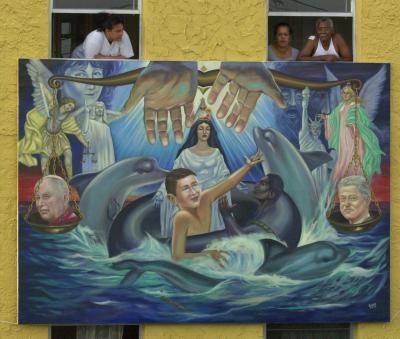Authorities feared footage of gleaming hospital in Michael Moore's Oscar-nominated film would provoke a popular backlash http://www.guardian.co.uk/world/2010/dec/17/wikileaks-cuba-banned-sicko Cuba banned Michael Moore's 2007 documentary, Sicko, because it painted such a "mythically" favourable picture of Cuba's healthcare system that the authorities feared it could lead to a "popular backlash", according to US diplomats in Havana. The revelation, contained in a confidential US embassy cable released by WikiLeaks , is surprising, given that the film attempted to discredit the US healthcare system by highlighting what it claimed was the excellence of the Cuban system. But the memo reveals that when the film was shown to a group of Cuban doctors, some became so "disturbed at the blatant misrepresentation of healthcare in Cuba that they left the room". Castro's government apparently went on to ban the film because, the leaked cable claims, it "knows the film is a myth and does not want to risk a popular backlash by showing to Cubans facilities that are clearly not available to the vast majority of them." Sicko investigated healthcare in the US by comparing the for-profit, non-universal US system with the non-profit universal health care systems of other countries, including Cuba, France and the UK. It was nominated for an Oscar for best documentary feature but was also castigated for being naive and tendentious. The cable comes from the United States Interests Section in Havana (USINT) – staffed by US foreign service personnel and local staff employed by the department of state, the unit is formally a section of the Embassy of Switzerland, although it operates independently of the Swiss in virtually all but protocol respects. The secret 2008 cable is based on reports from the USINT's foreign service health practitioner (FSHP) of her conversations with local people, unauthorised visits to Cuban hospitals, and experience of helping USINT American and Cuban personnel access healthcare. The cable describes a visit made by the FSHP to the Hermanos Ameijeiras hospital in October 2007. Built in 1982, the newly renovated hospital was used in Michael Moore's film as evidence of the high-quality of healthcare available to all Cubans. But according to the FSHP, the only way a Cuban can get access to the hospital is through a bribe or contacts inside the hospital administration. "Cubans are reportedly very resentful that the best hospital in Havana is 'off-limits' to them," the memo reveals. According to the FSHP, a more "accurate" view of the healthcare experience of Cubans can be seen at the Calixto Garcia Hospital. "FSHP believes that if Michael Moore really wanted the 'same care as local Cubans', this is where he should have gone," the cable states. A 2007 visit by the FSHP to this "dilapidated" hospital, built in the 1800s, was "reminiscent of a scene from some of the poorest countries in the world," the cable adds. The memo points out that even the Cuban ruling elite leave Cuba when they need medical care. Fidel Castro, for example, brought in a Spanish doctor during his health crisis in 2006. The vice-minister of health, Abelardo Ramirez, went to France for gastric cancer surgery. The neurosurgeon whoheads CIMEQ [Centro de Investigaciones Médico-Quirúrgicas] hospital – widely regarded as one of the best in Cuba – came to England for eye surgery, returning periodically for checkups. "After living in Cuba for two and a half years, treating numerous Cuban employees at USINT, and interacting with many other Cubans, the FSHP believes … preventive medicine in Cuba is a by-gone ideal, rather than the standard practice of care," the memo concludes.WikiLeaks: Cuba banned Sicko for depicting 'mythical' healthcare system
"Nobody is in agreement…It’s that, no one says it and no one takes the risk to say it, to speak the truth. That’s what is happening. In other words, one of the foundations, of what are the regimes in the entire world, in all of history, has been fear and lies. In other words, once you are in fear that's when you don’t take a risk, where you collect yourself and don’t unite…understood? To be in fear is not to offer help to anyone because that signifies risk." -Gorki Águila Carrasco, lead singer, guitarist of the music group Porno Para Ricardo and political prisoner
"Socialist ideology, like so many others, has two main dangers. One stems from confused and incomplete readings of foreign texts, and the other from the arrogance and hidden rage of those who, in order to climb up in the world, pretend to be frantic defenders of the helpless so as to have shoulders on which to stand." --Jose Marti

View Che Guevara's Forgotten Victims on Scribd
SEARCH? GOOGLE IT!
Saturday, December 18, 2010
WikiLeaks: Cuba banned Sicko for depicting 'mythical' healthcare system
Posted by
AMERICA'S FREE PRESS
at
9:30 PM
![]()
Labels: Banned film, Julian Assange, Michael Moore, Wikileaks
Subscribe to:
Post Comments (Atom)





No comments:
Post a Comment